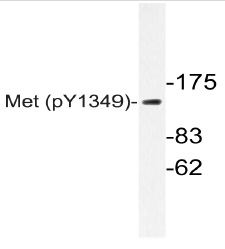MET pTyr1349 Rabbit Polyclonal Antibody
Other products for "MET"
Specifications
| Product Data | |
| Applications | WB |
| Recommended Dilution | Western blot: 1/500 - 1/1000. |
| Reactivities | Human, Mouse, Rat |
| Host | Rabbit |
| Clonality | Polyclonal |
| Specificity | This antibody detects endogenous levels of c-Met protein only when phosphorylated at Tyr1349. |
| Formulation | Phosphate buffered saline (PBS), pH 7.2 State: Aff - Purified State: Liquid purified Ig fraction Preservative: 0.05% sodium azide |
| Concentration | 1.0 mg/ml |
| Purification | Affinity chromatography (> 95% (by SDS-PAGE) |
| Conjugation | Unconjugated |
| Storage | Store undiluted at 2-8°C for one month or (in aliquots) at -20°C for longer. Avoid repeated freezing and thawing. |
| Stability | Shelf life: one year from despatch. |
| Predicted Protein Size | ~ 170 kDa |
| Gene Name | Homo sapiens MET proto-oncogene, receptor tyrosine kinase (MET), transcript variant 2 |
| Database Link | |
| Background | The c-Met oncogene was originally isolated from a chemical carcinogen-treated human osteogenic sarcoma cell line by transfection analysis in NIH/3T3 cells. The Met protooncogene product was identified as a transmembrane receptorlike protein with tyrosine kinase activity that is expressed in many tissues. A high proportion of spontaneous NIH/3T3 transformants overexpress c-Met and by transfection analysis the c-Met proto-oncogene has been shown to exhibit transforming activity.Tyrosine phosphorylation of apparently normal Met protein has also been observed in certain human gastric carcinoma cell lines. Tyrosine phosphorylation enhances the receptor kinase activity, while serine phosphorylation of Met on residue 985 has an inhibitory effect. The c-Met gene product has been identified as the cell surface receptor for hepatocyte growth factor, a plasminogen-like protein thought to be a humoral mediator of liver regeneration. |
| Synonyms | Hepatocyte growth factor receptor, MET, Scatter factor receptor, HGF/SF receptor, c-Met |
| Reference Data | |
| Protein Families | Druggable Genome, Protein Kinase, Transmembrane |
| Protein Pathways | Adherens junction, Axon guidance, Colorectal cancer, Cytokine-cytokine receptor interaction, Endocytosis, Epithelial cell signaling in Helicobacter pylori infection, Focal adhesion, Melanoma, Pathways in cancer, Renal cell carcinoma |
Documents
| Product Manuals |
| FAQs |
| SDS |
{0} Product Review(s)
0 Product Review(s)
Submit review
Be the first one to submit a review
Product Citations
*Delivery time may vary from web posted schedule. Occasional delays may occur due to unforeseen
complexities in the preparation of your product. International customers may expect an additional 1-2 weeks
in shipping.






























































































































































































































































 Germany
Germany
 Japan
Japan
 United Kingdom
United Kingdom
 China
China



